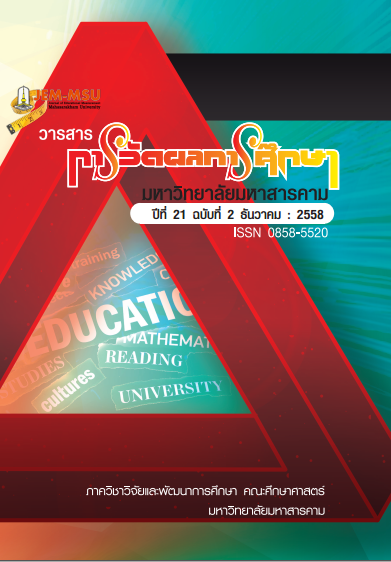Lecturers’ Evaluations of Student Learning Outcomes According to TQF for Higher Education (2009) and Students’ Readiness for ASEAN
Main Article Content
Abstract
The objective of this research were to study lecturers’ different job contracts
affecting their instructions, and to analyze the lecturers’ evaluation of student learning
outcomes according to TQF for higher education (2009) and the readiness for ASEAN.
Population was 491 lecturers making 217 samples (p<0.05) in 3 institutes in Surin;
Rajamangala University of Technology-Isan, Surin Campus, Surindra Rajabhat University,
and Boromarajonani College of Nursing, Surin. Data was collected during December 3 –
15, 2012 and analyzed by descriptive statistics; percentage, f-test, post hoc, means,
standard deviations, and confirmative factor analysis.
The study found 3 mains results. Firstly, in general, the job contracts did not
affect lecturers’ instructions except that there were different (p>0.05) in lecturing skills
between civil-servant lecturers and government official lecturers. Secondly, lecturers
evaluated students according to TQF and their readiness for ASEAN covering 8 learning
outcomes; 5 areas according to TQF and their readiness for ASEAN plus 2 more areas
which were the skills of evaluation and the integration. Thirdly, the CFA revealed 13
areas of students’ learning outcome evaluation. The first 5 areas were knowledge,
desired characteristics, communication skills, relationships and responsibilities, and
students’ readiness for ASEAN.
Article Details
The content and information contained in the published article in the Journal of Educational Measurement Mahasarakham University represent the opinions and responsibilities of the authors directly. The editorial board of the journal is not necessarily in agreement with or responsible for any of the content.
The articles, data, content, images, etc. that have been published in the Journal of Educational Measurement Mahasarakham University are copyrighted by the journal. If any individual or organization wishes to reproduce or perform any actions involving the entirety or any part of the content, they must obtain written permission from the Journal of Educational Measurement Mahasarakham University.


